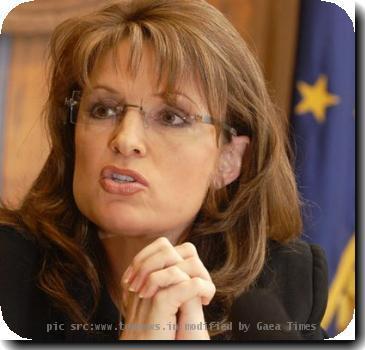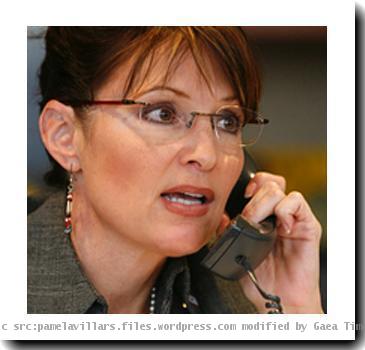Alaska governor Parnell restores sense of calm after Sarah Palin’s stormy tenure
By Becky Bohrer, APSunday, July 25, 2010
Alaska gov restores calm after stormy Palin tenure
JUNEAU, Alaska — Perhaps Sean Parnell’s greatest accomplishment so far as governor is that he’s not Sarah Palin.
In the year since inheriting the job when Palin resigned, Parnell has quietly gone about restoring a sense of calm that many Alaskans craved after the storm-that-was-Sarah. Barring any major missteps, that alone may be enough to help him carry next month’s GOP primary and win the office he wasn’t expecting hold.
Parnell is not considered particularly vulnerable, according to the non-partisan, Washington, D.C.- based Rothenberg Political Report, despite challenges from Republicans Ralph Samuels and Bill Walker and a Democratic contender this fall. The report’s political editor, Nathan Gonzales, said the race would be much higher profile had Palin stuck around, with lots of cash being raised from outside the state.
“I don’t think anyone outside of Alaska knows who Sean Parnell is, and that’s a good thing for him,” Gonzales said. “As long as he’s doing his job and people have a positive opinion of him, I think being under the radar is a good position to be in for him.”
Flashy and brash he’s not. Parnell can walk among the tourists in Juneau without notice, a sharp contrast to Palin. He’s not known as a fiery orator. He can declare his “passion is for people” in the same tone he uses to lay out policy points. He maintains his allegiance to Palin, in a state still bitter over her departure, while not exploiting his ties as other candidates have.
And supporters and critics alike offer similar words to describe him — competent, cautious — in different contexts, of course.
“When I first became governor, my intention was not to be different” than Palin, Parnell said, but it was “to be who I am.” Parnell said. “I do have great respect for Gov. Palin and for her leadership here. (But) I have set a course with my own initiatives.”
During the last legislative session, Parnell scored partial wins in advancing his agenda: getting the $100 million he wanted for deferred maintenance projects; advancing the concept of a merit scholarship plan; gaining broad support for an initiative to curb domestic violence and sexual assault — an effort rooted in Parnell’s own family experience. He talks about an abusive grandfather and how his father ended the cycle of violence.
There’ve been several controversial Parnell vetoes, as well as a dust-up over his hiring of a former state lawmaker to a newly created military affairs adviser’s post.
Parnell rejected expansion of a state-sponsored health insurance program for low-income pregnant women and children, saying he’d only recently learned the program paid for abortions. Democrats accused him of playing politics with children and families.
Attorney General Dan Sullivan took the heat on the hiring issue, saying there were shortcomings in the legal analysis and advice Parnell received.
Overall, though, Parnell has largely avoided the limelight, maintaining relatively high favorability ratings in the process, according to pollster Marc Hellenthal.
There’ve been no real crises on his watch. The unemployment rate has begun to fall, and oil prices haven’t fallen far, allowing Alaska to avoid the steep budget cuts that other states have faced.
But major challenges loom.
While oil remains king, its revenue largely responsible for funding the state’s operation, production is expected to keep declining. There are no firm answers for how best to stem those revenue losses.
One long sought project that could help is a major natural gas pipeline.
Samuels and Walker have aggressively gone after Parnell’s approach to building the line.
Parnell remains committed to the process championed by Palin, which she said would spur competition in bringing North Slope gas to market. Two competing projects are currently seeking shipping commitments and gauging interest. Parnell cites this as proof the market will win out.
But Samuels said the state is really no further ahead than it was several years ago in realizing a line.
Walker favors an “all Alaska line” that he says would put put Alaska, not oil and gas companies, in the driver’s seat. He said Parnell has shown no leadership on the gas line.
While polls have favored Parnell and several analysts see the race as his to lose, the public is just starting to pay closer attention to the Aug. 24 primary.
Some Alaskans, like Elbertha Anker of Anchorage, like Parnell and think he’s done a good job but aren’t sure yet whether they’ll vote for him. Others, like Beverly Ward, who said she recently hosted a standing-room-only fundraiser for him in her home, are resolute in their support.
And there are those who think the entire slate of incumbents should go.
“I lost interest when Sarah became governor,” said Suzanne Hudson, 63, of Juneau, a longtime Republican who voted as a Democrat in the last presidential election and has grown frustrated with the entire process. “It doesn’t do much good to pick a party or complain. They’re not listening to the people. They’re really not.”
One potential and not easily measurable impact on the gubernatorial contest could be the state’s U.S. Senate race and who turns out for it, said Stephen Haycox, a University of Alaska Anchorage history professor. That race features U.S. Sen. Lisa Murkowski against Joe Miller, a self-described “constitutional conservative” endorsed by Palin and supported by the national Tea Party Express.
A strong Murkowski vote should bode well for Parnell, he said.
Hellenthal, who’s presently not working with any Alaska gubernatorial candidate, doesn’t think there will be much drama.
Parnell “could do something stupid; predicting the future is something that’s always hazardous,” he said. “But it would certainly be amazing if he did. That’s not his nature.”


